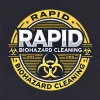Biohazards - What Should You Do When You Have One?

Prison Cell Cleaning in Edington
Get in touchPrison cell cleaning is crucial to maintaining hygiene, safety, and overall well-being within correctional facilities.
These environments are challenging due to the nature of their occupants and require specialised cleaning to handle biohazards, contaminants, and other potential hazards.
At Rapid Biohazard Cleaning, we understand the unique demands of prison cell cleaning and have the expertise, experience, and equipment to deliver exceptional results.
What is Prison Cell Cleaning?
Prison cell cleaning involves the thorough sanitisation and decontamination of inmate living areas within correctional facilities.
These areas often encounter various forms of biohazardous waste, including bodily fluids, blood, and other infectious materials, which pose significant health risks if not properly managed.
Regular and meticulous cleaning is essential to prevent the spread of diseases, maintain a safe environment, and ensure the dignity of all individuals within the facility.
What Does Prison Cell Cleaning Entail?
Initial Assessment: Our process begins with a comprehensive assessment of the prison cells to identify the extent of contamination and specific cleaning requirements. This step is crucial in determining the appropriate cleaning methods and materials needed.
Biohazard Removal: A primary aspect of prison cell cleaning is the safe removal and disposal of biohazardous materials. This includes handling blood, bodily fluids, and other infectious substances that can carry diseases. At Rapid Biohazard Cleaning, our trained professionals use industry-standard protective gear and adhere to strict safety protocols to ensure the safe handling of these materials.
Deep Cleaning and Disinfection: After removing biohazards, we thoroughly clean all surfaces within the cell, including walls, floors, beds, and fixtures. We utilise high-grade disinfectants and cleaning agents that are effective against a broad spectrum of pathogens. Our team pays special attention to high-touch areas to ensure thorough disinfection.
Odour Control: Unpleasant odours can be pervasive in prison cells, especially following biohazard incidents. We employ advanced odour-neutralising techniques to eliminate these smells, leaving the environment clean and fresh.
Final Inspection: After the cleaning process is completed, a final inspection is conducted to ensure that the cell meets our high standards of cleanliness and hygiene. This step also involves documenting the cleaning process for accountability and compliance with regulations.
Why Choose Rapid Biohazard Cleaning for Prison Cell Cleaning in TA7 9?
Specialised Expertise: We specialise in biohazard and forensic cleaning at Rapid Biohazard Cleaning. Our team is fully trained and certified to handle the unique challenges of prison cell cleaning, ensuring that all safety and regulatory requirements are met.
Advanced Cleaning Techniques: We use the latest cleaning technologies and methods to deliver superior results. Our approach is thorough, ensuring that every aspect of the prison cell is sanitised and free from contaminants.
Discreet and Efficient Service: We understand the sensitive nature of our work and operate with the utmost discretion. Our team works efficiently to minimise disruption to the facility’s operations while ensuring a clean and safe environment.
Compliance and Safety: Rapid Biohazard Cleaning is committed to upholding the highest standards of safety and compliance. We adhere to all relevant regulations and guidelines, ensuring that our cleaning practices are not only practical but also compliant with legal requirements.
Customer-Focused Approach: We take pride in our professional, helpful, and friendly service. We work closely with our clients to understand their specific needs and tailor our services accordingly, providing a reliable and trustworthy cleaning solution.
FAQs About Prison Cell Cleaning
Q: How often should prison cells be cleaned?
A: The frequency of cleaning depends on various factors, including the facility's size, occupancy levels, and specific incidents involving biohazards. However, regular cleaning is crucial to maintaining hygiene and preventing health risks.
Q: What types of biohazards are commonly found in prison cells?
A: Blood, bodily fluids, faecal matter, and other infectious materials are common biohazards. These substances can carry pathogens that pose serious health risks if not properly managed.
Q: Is Rapid Biohazard Cleaning certified to perform prison cell cleaning?
A: Yes, our team is fully trained and certified in biohazard cleaning and decontamination. We adhere to all relevant safety and regulatory guidelines to ensure the delivery of effective and compliant cleaning services.
Q: Can Rapid Biohazard Cleaning handle large-scale cleaning projects in correctional facilities?
A: Absolutely. We have the resources and expertise to manage cleaning projects of any scale, from individual cells to entire wings of a correctional facility.
Q: How does Rapid Biohazard Cleaning ensure the safety of its workers and facility staff during the cleaning process?
A: We prioritise safety by equipping our workers with personal protective equipment (PPE) and adhering to strict safety protocols. Additionally, we coordinate with facility staff to ensure a safe working environment for all.
Contact Us
In conclusion, prison cell cleaning is a specialised service that requires expertise, precision, and a commitment to safety. At Rapid Biohazard Cleaning, we offer premium cleaning services specifically designed to meet the unique needs of correctional facilities. With our comprehensive approach, advanced techniques, and customer-focused service, we ensure that every cell in every prison is clean and safe for both occupants and staff.
Contact Rapid Biohazard Cleaning today for more information or to schedule a consultation.
Let us help you maintain a clean, safe, and hygienic environment in your facility.
We cover Edington (Somerset)
